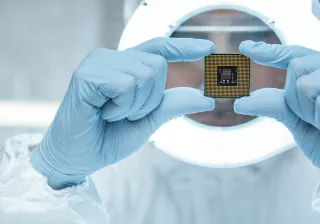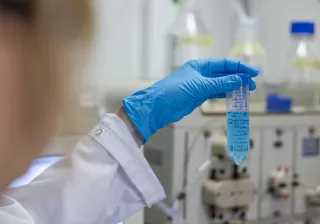Chips and the chip shortage are a hot topic today, for a good reason. The need for chips is extensive, it touches almost all applications on Earth from cars to satellites. On top of this, the green transition is digital, meaning it is dependent on the functionality, performance and availability of chips. However, it takes long for a chip to end up in a ready product. With close co-operation between research and companies, we can pave the way and accelerate refining expertise into innovations. At the same time, we create new business and economic growth to Finland.
The semiconductor shortage has triggered fast action in the European Union as well. The pending Chips Act is designed to increase the proportion of manufactured semiconductors to 20 per cent of the global production. The idea is to reach the goal by 2030. This means an estimated 11 billion euros in funding geared towards strengthening research, development and innovation.
Finland has its own significant role to play in easing the chip shortage in Europe. Even though we are a small country, we have special expertise in specialised semiconductor technology. This technology refers to integrated photonics, MEMS sensors, radio frequency communication, silicon detectors and quantum technology based on microelectronics. In addition, Finland is a forerunner in designing telecommunication network Systems-on-Chip.
In Finland, the technology of the majority of semiconductor businesses is based on specialised semiconductor technology. The turnover of these businesses in Finland is 1.5 billion euros and the majority of the products are exported. Export industry is important to Finland because it means income to Finland and our welfare state.
We lean on our strong expertise and specialisation, and are in a strong position to become one of the top countries in chip development in Europe. Significant investments of our biggest semiconductor businesses in Finland speak for this, as do new startup companies, the potential unicorns of the future. However, this requires a strong national vision and investments. Finnish semiconductor actors have now presented the 'Chips from Finland' (Siruja Suomesta) initiative (in Finnish) that defines the key measure proposals for developing the field. There is a need to increase co-operation between different actors and more should be invested in piloting environments.
Discussing semiconductor technologies means we are also discussing security of supply. As a part of the EU, we aim at a strategic autonomy in critical technologies. Their global market is also strongly growing. This does not mean doing everything in Finland or Europe, but rather strengthening the most vulnerable parts of the global value chain. As things are, you cannot build a mobile phone with just European parts, let alone just Finnish parts.
Piloting environments central in growth of semiconductor industry
The R&D research and development of semiconductor technology requires cleanrooms and versatile piloting environments. It is evident, small startups or even larger growth companies cannot invest in their own cleanrooms and expensive production equipment. This means there is a need for shared equipments and facilities that can be used for testing, developing, piloting and manufacturing the first small series. When the innovations have been applied into practice, the production can be transferred to the companies’ own production facility.
We actually have an example of successful co-operation between research and businesses close-by. There is currently a shared research and development environment called Micronova in Otaniemi, Finland. The benefits of a bold investment made 25 years ago are currently being reaped among companies operating in the specialised semiconductor industry and quantum technology.
However, realising the growth potential of companies right now requires an investment in new, larger facilities. These facilities should focus on R&D and scaling research competence to aim for new technologies and products. Kvanttinova, a new project, is responding to this need from the point of view of the companies. The initiative has gained strong support in the industry and over 10 companies have joined the concrete planning of the project. When realised, the new Otaniemi-based piloting environment will provide a new shared platform where new microelectronics and quantum technologies can be developed and scaled in a much larger scale than before, as co-operation between research and businesses.
Joining market growth
The global market of microelectronics has been estimated to nearly double to 1,000 billion euros by 2030. In addition, the future quantum era will challenge the development of all sectors, forecasting growth for the near future. It is clear we want to be a part of this growth.
Kvanttinova helps the 'Chips from Finland' (Siruja Suomesta) initiative to create a leading semiconductor hub of Europe in Otaniemi. It will help Finnish companies grow and also attracts large international companies to participate and invest in Finnish RDI. This will create a positive growth spin. The time is now to invest in co-operation.





